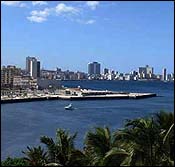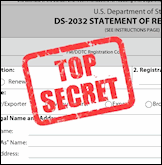 In yesterday’s post, I discussed the ramifications of the debarment of six freight forwarders — Bax Global, Inc.; Ceva Logistics LLC; EGL, Inc.; Kuhne and Nagel International AG; Panalpina, Inc. (including its Swiss affiliate Panalpina Welttransport Holding AG); and Schenker AG — from government contracting. The State Department’s Directorate of Defense Trade Controls (“DDTC”) has today issued a guidance indicating that these parties are indeed ineligible to participate in any transaction involving the export of defense articles.
In yesterday’s post, I discussed the ramifications of the debarment of six freight forwarders — Bax Global, Inc.; Ceva Logistics LLC; EGL, Inc.; Kuhne and Nagel International AG; Panalpina, Inc. (including its Swiss affiliate Panalpina Welttransport Holding AG); and Schenker AG — from government contracting. The State Department’s Directorate of Defense Trade Controls (“DDTC”) has today issued a guidance indicating that these parties are indeed ineligible to participate in any transaction involving the export of defense articles.
First, for the good news. Existing authorizations that include any of the six freight forwarders will be unaffected. Exporters can ship under licenses now in their hands even if the license refers to one of the six freight forwarders at issue.
Now for the bad news. Licenses received by DDTC after February 18, 2012, that name one of these freight forwarders and which do not contain a transaction exception request will be returned without action, unless a transaction exception request is filed with DDTC within three days of the issuance of the guidance. Those days apparently include this weekend, so unless you get a transaction exception request to DDTC by this Monday, February 27, your license application will be returned. (Have a nice weekend!)
It is not clear what will happen to pending applications received before February 18, 2012. The guidance says that they will be “reviewed by DDTC in the normal course,” whatever that means. Probably that means that the license will be granted with provisos or amendments excluding the six freight forwarders.
And although the guidance does not say this directly, you can be certain, indeed you can bet the farm, that no transaction exception requests are going to be granted. The guidance says that the transaction request should explain
why the generally ineligible entity should be part of the transaction (i.e., why the applicant is unable to utilize a different freight forwarder), and how the inclusion of the ineligible entity is in the interests of U.S. foreign policy or national security.
In other words, don’t waste your time because I do not see how you can ever demonstrate that no other freight forwarder is available.
It bears repeating that, as I said yesterday, the Arms Export Control Act does not require DDTC to do this. DDTC has the discretion not to do this. Where there is no reason to believe that the antitrust plea is evidence that these freight forwarders are now more likely to violate the ITAR in connection with their shipments, there is absolutely no reason to exclude these freight forwarders from all ITAR-related exports. Indeed, DDTC is removing from the pool of freight forwarders companies with substantial ITAR experience. This will force exporters to use smaller, less experienced companies who are more likely to violate the ITAR precisely because of their inexperience. DDTC foot, meet bullet. Bullet, meet DDTC foot.
 The Office of Foreign Assets Control (“OFAC”) has nixed plans to start passenger ferry between Miami and Havana, Cuba. According to a letter sent to a company requesting such service, OFAC said that, after consulting with the State Department, such service would be “beyond the scope of current policy.”
The Office of Foreign Assets Control (“OFAC”) has nixed plans to start passenger ferry between Miami and Havana, Cuba. According to a letter sent to a company requesting such service, OFAC said that, after consulting with the State Department, such service would be “beyond the scope of current policy.”
 Posted by
Posted by  Category:
Category: 

 Take a gander at this headline of a
Take a gander at this headline of a  We all know about exporters who, having spent the money to register with the Directorate of Defense Trade Controls (“DDTC”), can’t resist crowing about it, with some even implying in press releases that registration is a certification from DDTC that the registered exporter has passed some test and is now certified as ITAR-compliant, which, of course, is untrue.
We all know about exporters who, having spent the money to register with the Directorate of Defense Trade Controls (“DDTC”), can’t resist crowing about it, with some even implying in press releases that registration is a certification from DDTC that the registered exporter has passed some test and is now certified as ITAR-compliant, which, of course, is untrue.
 In
In 

